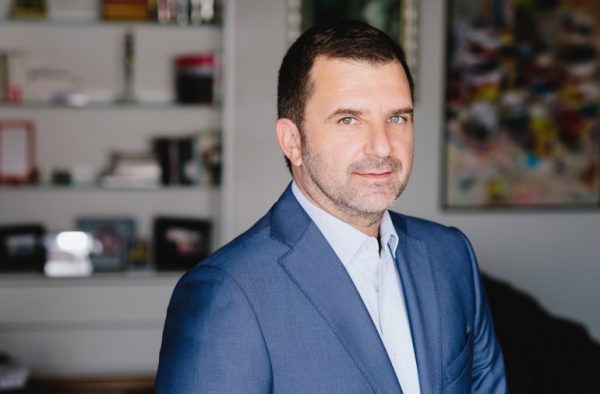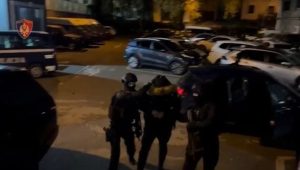05.07.2021 – 20:21
While the decision of the Constitutional Court on the fate of the destruction of the National Theater is being accompanied by the unusual silence of Edi Rama and the stupid cacophony of Veliaj, there are some things that need to be clarified to understand what really happened. The truncated body of the constitutionalist has shown once again that she has no intention of becoming a barricade to political power even when the latter has her hands dipped in crime. She has refused to consider the terrible decision of the municipal council, to demolish a historic building in the center of Tirana, one night of state of siege, at the height of measures against the pandemic.
In an equilibrium dance intertwined with the concern not to ruin the work of the government, not to thwart his grandiose plans, as well as the clamor to preserve the facade of an institution newly born from justice reform, the court decision has told some truths.
They help you to understand not only what happened, but also shed light on the debate that has been going on for several years in the country, between those who wanted to preserve a rare heritage value and others who saw it as a fat plot. from which millions could be gained. By rejecting the special law, which was invented only to favor a private company, Fusha SHPK, to elevate a tower business in the center of Tirana with an approximate profit of 200 million euros, the court has acquitted all people in power who were invested to profit from this business and all the pro mercenaries (artistic and media) who defended the idea that the theater could be built with the money gained from the skyscrapers. According to the Constitution, this law “sui generis”, which was made only to rob, violates the principles of economic freedom, autonomy of local government and those of protection of cultural heritage.
So the question that comes back to attention, now that even in the interpretation of the constitution this special law has been massacred, remains the same: why should this sample be born?
The facts of how this event took place, which Lapsi.al has reflected step by step, prove that it was all done just to steal. The chronology reminds us that in mid-2016, Edi Rama called the Danish architect Bjarke Ingels to order the design of a new theater. What would later be sold to the public as an initiative devised by Shkëlqim Fusha, to take advantage of the unsolicited offer was a hoax. Fusha neither intended to build a theater, nor had he ever heard of a great architect named Bjarke on this globe. He wanted to take advantage of the public land behind the theater and for this, at the same time as Rama met with the Dane, he legalized an office with an area of less than 300 square meters, in the middle of a huge building plot of 9 thousand meters.
So this is where the premises of a huge affair were created. Fusha was allegedly invented as the creator of the unsolicited offer that was also sold as a landowner.
This became Archimedes’ lever to set up million-dollar plans.
In April 2017 Rama signed the removal of the theater from the museum center of Tirana where he had once placed it himself. Shortly afterwards, all state institutions were put at the service of manipulation, leading from ministries to scientific institutes to produce false reports about a National Theater that causes cancer, which poses a fire risk, is on the verge of collapse in case earthquake and the cost of reconstruction of which is greater than a new construction.
The idea of a special law was also invented for this, because otherwise the alienation of the land would have to be passed to the municipal council of Tirana, where the socialists did not then ⅔ have the necessary votes.
Under the pretense that we should definitely make the capital with new theater for which the state does not have the money to build, the project of six towers that the field would build was scandalous. He broke every norm and law of the urban plan. In the area of 6200 meters where the towers would be erected, the land use would be the highest in Tirana 63.47%. But also the intensity of construction from 5.5 that was predicted by the maximum of the capital, in the case of the towers of Fushë would be 6.6.
So all this business according to which the forecasts earned a full 200 million euros was done with the justification to raise money for the establishment of the theater.
The civil revolt, the intervention of Brussels and the referral of the case to the Constitutional Court by the president temporarily stopped this affair.
They caused the concern for the erection of skyscrapers to be separated from the propaganda about the necessity of a modern theater.
Rama and Veliaj were forced to admit that all this was a fraud under pressure, and in the end, after fabricating Fushë’s resignation, they accepted that the building could be built by the state by taking loans.
In fact, they long ago abandoned the predatory essence of this special law that the Court recently declared unconstitutional.
So, in a sense, the current decision has no legal value or consequence. He has repealed a law that its drafters and implementers had thrown in the trash long ago.
But morally he gains quite a bit of weight. Because he proves that all unconstitutional acts have been done specially. That the violation of the principles of economic freedom, preservation of heritage, protection of local autonomy and implementation of the international agreement has not been innocent.
They were intentional, in the name of a business of 200 million.
So while it can neither stop the massacre nor guarantee the authentic reconstruction of what collapsed, the Constitutional Court gave far more arguments to those who think the demolition of the theater was originally an economic crime. She once again pointed the finger, who were those who were listed in the name of protecting the public interest and who were the mercenaries who allegedly talked about modern theater, just to justify the theft.
In terms of a castrated justice, although it is insufficient, the decision given by the constitutionalist can not be considered small.




